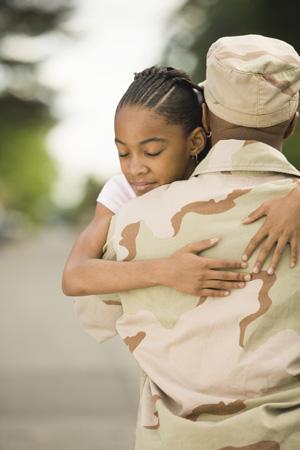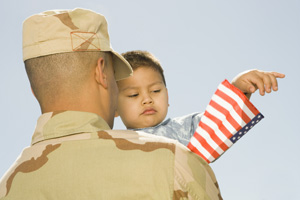Scroll down for a list of resources + ways you can support local military families.
 Is someone going to kill my daddy?” Melissa Seligman’s 6-year-old daughter, Amelia, asked her not long ago. “Would you marry another daddy?”
Is someone going to kill my daddy?” Melissa Seligman’s 6-year-old daughter, Amelia, asked her not long ago. “Would you marry another daddy?”
Amelia’s daddy is David Seligman, a 32-year-old serviceman who was stationed in Iraq on his third deployment to the Middle East. While he was gone (he returned home in July), his wife, Melissa, author of the memoir The Day After He Left for Iraq, struggled to keep the home fires flaming as radiantly as possible for Amelia and her 4-year-old brother, Elijah.
Like every parent, Seligman wants to keep her children feeling happy, safe and perhaps most of all, normal.
The trouble is, “normal” doesn’t exist for today’s military families. Lengthy and multiple deployments to Iraq and Afghanistan are affecting marriages and military home life in a way that’s historically unprecedented and profoundly troubling.
“In Vietnam, there was a draft,” says Christina Piper, a Spokane native who teamed with Melissa Seligman to write A Heart Apart, a book to help military children cope with a parent’s absence. “What’s different now is that we are in two wars, it’s a volunteer force, and these troops are constantly going overseas.”
The fallout is striking. Divorce rates among those on active duty have increased steadily since 9/11. And after eight years of war, more than 200,000 military marriages have failed — 27,000 last year alone, according to the Army Times. Edmonds resident Michael J.R. Schindler, in his book, Operation Military Family, reports that when a spouse goes off to war, 20 percent of marriages fall apart within two years.
And when a parent goes off to war, kids like Amelia — whose dad has been gone 85 percent of her life, her mother estimates — have real trouble coping. One-third of the children facing persistent separation from a parent suffer from anxiety, reports a 2009 RAND study. The study also found that military kids — especially the older ones — face more peer- and school-related difficulties than other children.
Paula Beckner doesn’t need stats to tell her how tough life is on the home front. “I just got a call from my 6-year-old son’s school. He got in trouble again,” says Beckner, a Marysville resident. Her husband (stepdad to her three boys) recently left again — he’s gone 13 out of 15 months — for sea duty in the Persian Gulf. “My son always gets into more trouble in school when his stepfather is gone.”
 Trying to cope
Trying to cope
Seligman says Amelia doesn’t really comprehend what’s going on. But she does know enough to announce, “I hate this military!” Seligman asked Amelia if she knew there’s a war going on, that other daddies have died. Amelia began to cry. Her daddy, she insisted, weeping, is the only one who matters.
Seligman told her, “There are people who would like to kill him. But you’ve seen his equipment and his tanks. Those are his protective things to help him come home to you.”
Piper’s husband has been deployed four times, each tour a year long. Her kids, ages 4 and 6, see other dads going to their children’s soccer games, or reuniting with their families on news broadcasts. “They’ll say, ‘Why can’t my dad come home, too? ’” Piper says.
Right now, the family lives at the National Training Center at Fort Irwin, California — the Pipers’ seventh move in nine years. “Changing locations can be stressful,” says Christina Piper. “But most of us roll with it. The most difficult part is that my husband misses so much: dance recitals, the baby’s first steps, losing the first tooth. And the kids are growing up without a father figure.”
Also difficult is the endless worry about her husband’s safety. “There’s that constant fear and stress of never knowing,” says Piper. “You are always on the verge of getting that knock on the door.”
She gets panic attacks when she hears the Carrie Underwood song about a fallen soldier, “Just a Dream”:
Baby, why’d you leave me?
Why’d you have to go?
I was counting on forever, now I’ll never know.
Piper doesn’t downplay her kids’ worries or feelings. “When they hear something scary, we talk about it,” she says.
One day she gave her 6-year-old daughter a Daddy Doll, a custom-made doll that’s dressed like a soldier and bears her father’s photo. “She sobbed for 45 minutes,” says Piper. “I told her it’s OK to be sad or angry or scared. I told her he’s going to try his hardest to come back to us. But I couldn’t promise he’s going to be OK, because we don’t know.”
 Coming home
Coming home
We’ve seen the news stories: A soldier returns from Iraq or Afghanistan. He surprises his son at school, or his wife at work. Joy ensues. Everyone is deliriously happy and seems to disappear into some gentle, glowing sunset, destined to live blissfully ever after.
Reality is much more complicated. Coming back home — it’s called reintegration — can be grim. “I don’t think many people understand that the welcome home is never the end of the story, but rather a new beginning of a different battle,” says Seligman.
Vets often undergo war experiences they can’t — or won’t — share with their spouse, says Schindler. “They want to forget. They don’t want to go to a psychologist; there’s a stigma attached to that. Maybe they jump at every loud noise. And maybe they fall into drug and alcohol abuse.”
John E. Lee, director of the Washington State Department of Veterans Affairs, says we’ve yet to discover the ways war affects service members and their families. “We all know war changes people,” he says. “It can be a bad thing, especially if you’ve been gone for your fourth tour. Coming back home is a hell of lot different than being on the streets of Baghdad.”
Military suicide rates hit an all-time high last June, when soldiers killed themselves at the rate of one per day, according to USA Today. And post-traumatic stress disorder (PTSD) continues to pose enormous challenges. PTSD affects 20 percent to 30 percent of veterans with multiple deployments to combat areas, according to Dr. David Kearney of the VA Puget Sound Health Care System.
“Those suffering from it have a profound sense of vigilance toward their surroundings and avoid situations that feel like a threat,” says Kearney. “This might be traveling under overpasses or going out into public spaces.”
PTSD can lead to social isolation and unresolved anger and shame, he says. “Often, there’s an intense emotional numbing — a feeling of disconnectedness.” New addiction issues can surface and affect a vet’s ability to work, he says. “PTSD is disruptive to marriages and interpersonal relationships of all types.”
Rebuilding relationships
Jill Morgenthaler lives near Chicago with her husband, her son, 15, and her daughter, 12. After spending 30 years in the military, Morgenthaler is now a consultant with the Department of Homeland Security. As a reservist, she was deployed twice, once to Bosnia and, in 2004, to Iraq.
That year in Iraq was among the war’s most dangerous, she says. Following attacks, she’d send her husband and children email messages to let them know she was all right.
She worried about her family. Despite the dangers she faced, she figured she had the “easy life,” because she had to focus on just one thing: her job. “He had the job, the kids, the carpooling and the care,” she says. “It hurt his work; he couldn’t stay late at the office.”
Coming home wasn’t easy. “I had a very short fuse and no patience for bureaucracy or unimportant things,” she says. Loud, booming sounds threw her; she still suffers from flashbacks. “I’m fine on July 4. But when people set off fireworks ahead of time, my whole body goes stiff. I have to resist the impulse to dive under the table.”
Morgenthaler also faced challenges in her personal relationships. Her children were proud of her (“My son thought he had the coolest mom in ninth grade”), but resented her absences. She missed her daughter’s music recital. “Well, Mom, you weren’t there,” her daughter grumbled.
She had a tough time getting her marriage back on track. “I felt like I was living with a stranger,” she says. “When you’re separated more than six months, the fabric of the family starts to break.”
Those separations create communication barriers that can be devastating, says Seligman. “Military wives spend years not wanting to worry our husbands, so we keep our emotions bottled up. When they come home, we have a year’s worth of feelings to express — and so do they.”
Families learn to muddle through everyday issues and obstacles when a spouse is gone: the flooded basement, the weedy lawn, the parent-teacher conferences. When a husband or wife returns home, divvying up duties takes considerable negotiating skills.
“Some wives think, ‘You’ve been gone, now it’s all yours,’” says Piper. “Other wives have been doing the bills, cars and kids, and don’t intend to give those up when their husband comes back.”
Often, a military husband wants to pick up where he left off, says Armin Brott, author of The Military Father: A Hands-on Guide for Deployed Dads. “He wants to walk into a family where he’s appreciated. Instead, he’s walking into a family who has figured out how to manage without him.”
 For the long run
For the long run
Military families recognize that the world they inhabit is infinitely different from yours and mine.
But these families wouldn’t change things. They respect the U.S. military and feel deeply that what they do matters. “I’ve helped make lives better,” Morgenthaler notes. Her 18-year-old daughter is considering a military career. Says Morgenthaler, “I’d love that.”
Christina Piper understands her husband’s sense of duty. “He has a call to serve. He gave his word. And he’s in it for the long run."
Candice Herken’s family is soon moving from Joint Base Lewis-McChord, Washington, to Fort Campbell, Kentucky, their fourth move in eight years. For Herken, the moves, the uncertainty and the sheer work of single-handedly managing family life have been daunting. “We have kids by ourselves, we raise kids by ourselves,” says Herken. Still, she can’t envision any other life. “I knew what I was getting into,” she says. “I don’t feel resentful; that would make me a miserable person.”
Many families share the sense, however, that the outside world doesn’t understand the challenges they face. “One lady told me she knows how I feel, having my husband away so much,” says Piper. “Her husband got tied up on a bus trip. But that’s not the same as having your husband lying in the dirt with mortars going around him.”
Devra Renner’s husband has been in the Air Force for 23 years. He’s now stationed at the Pentagon, but in the early ’90s, he served in the Gulf War, then Kosovo. “I can understand that my friends get confused about what the military is or isn’t,” says Renner, a senior consultant for Zero to Three’s project Coming Together Around Military Families. “But the one thing they can’t wrap their heads around is that my husband could have died any time he was deployed.”
In August, the last U.S. combat troops — a convoy from Joint Base Lewis-McChord — left Iraq. But about 50,000 U.S. troops will remain in the country in noncombat roles.
Piper says the idea that “the war is over” creates a false state of mind for military families — and for the public. “People think, ‘Oh, your husband’s fine now.’ But we’re treading unknown territory. Our spouses could be deployed to Afghanistan, and it’s been particularly bad there lately. We’re holding our breath; we don’t know what’s coming. And whether it’s Iraq or Afghanistan, we’re not done until every one of them comes home.”
Linda Morgan is ParentMap’s associate editor and the author of Beyond Smart: Boosting Your Child’s Social, Emotional, and Academic Potential.
Do you know a returning vet who needs help? Or a family facing reintegration issues?
John E. Lee, director of the Washington State Department of Veterans Affairs, asks that you contact him for help. Send your friend’s or relative’s name and phone number to Lee at 800-562-2308 or 360-725-2152; or email him at john@dva.wa.gov.
Resources
Websites
Operation Military Family (OMF): Led by Michael Schindler and based in Edmonds, OMF works to strengthen military marriages and families.
Veterans Family Fund: A grassroots organization that allows Washington residents to purchase Veterans Family Fund CDs.
Operation Homefront: Provides emergency financial and other assistance to the families of service members and wounded soldiers.
Daddy Dolls: Custom-made doll in uniform with photo of child’s father.
Zero to Three: Coming Together Around Military Families: Zero to Three’s project to help military families.
Her War, Her Voice: Discussions and blogs supporting military family life, by Melissa Seligman and Christina Piper.
USO: Here’s how to donate to help support the troops.
Books
Operation Military Family: How to Strengthen Your Military Marriage and Save Your Family by Michael J.R. Schindler
The Military Father: A Hands-on Guide for Deployed Dads by Armin A. Brott
The Day After He Left for Iraq: A Story of Love, Family and Reunion by Melissa Seligman
A Heart Apart, a book for children with a deployed military parent by Melissa Seligman and Christina Piper









